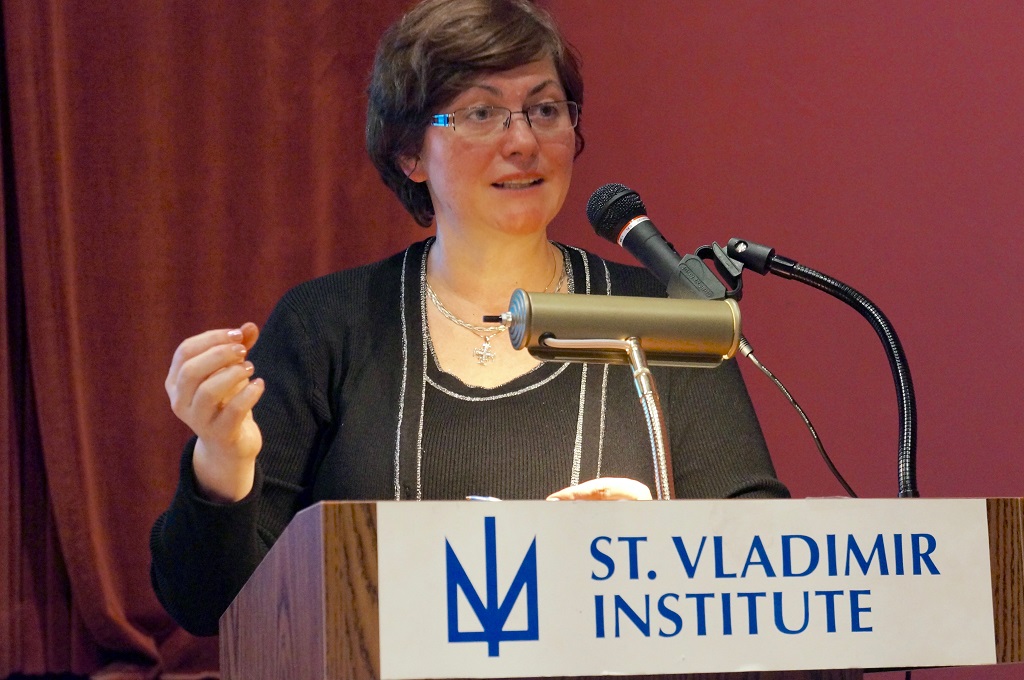Marta Baziuk, Holodomor Research and Education Consortium, Toronto.
The Holodomor was a central theme at the conference “Empire, Colonialism, and Famine in Comparative Historical Perspective,” held October 28-29 in Toronto. This is the fourth international conference organized by the Holodomor Research and Education Consortium (HREC) of the Canadian Institute of Ukrainian Studies (University of Alberta).
The first day, held at University of Toronto, featured presentations on the Irish Famine, the Holodomor, and the Bengal Famine of 1943. Liudmyla Hrynevych, from the Institute of History, National Academy of Sciences of Ukraine, presented on “The Ukrainian Holodomor in the Context of Soviet Imperialism.” Dr. Hrynevych noted that the Ukrainian Famine is most often understood through the prism of communism and totalitarianism, with imperialism and colonialism marginal to intellectual discussions. She outlined the colonial policies of the Kremlin and the massive, forcible extraction of grain at the expense of the Ukrainian people, adding that “It was precisely the depriving of Ukrainian authorities of the right to manage the harvest that led to the Holodomor.” Discussant Mark von Hagen of Arizona State University noted that already by 1921 the political activist Pavlo Khrystiuk had raised the question of Ukraine’s subordinate status, as would the economist Mykhailo Volobuiev in the late 1920s, before an anti-colonial critique in Ukraine became impossible.
In his presentation, Peter Gray (Queen’s University, Belfast) looked at how the Irish Famine does and doesn’t qualify as “colonial.” He noted that a contributing factor in that Famine was the portrayal of the Irish as “the other” by imperial British officials. Panel discussant Mark McGowan (University of Toronto) praised Gray for providing often overlooked context. Janam Mukherjee (Ryerson University, Toronto), in his presentation “Bengal Famine—Famine in the Bengal: Colonialism and Causality,” noted that although that famine has been attributed to policies of Winston Churchill, these were “really only the tip of the colonial iceberg.” He explained the role of the establishment of Calcutta as a military centre in war time, which included food procurement and distribution at the expense of its hinterland, as well as the selfinterest of colonial and domestic actors who indulged in grain hoarding and speculation. The discussant, Andrea Graziosi of the Università di Napoli Federico II, remarked on the suffering that can occur in a colonial situation during a war-time economy, the denial of famine by imperial powers, and the attempted flight to cities from the countryside in both the Ukrainian and Bengal famines.
In the panel that concluded the first day, Professor Graziosi discussed the Holodomor as an example of a twentieth-century political famine and touched on the role played by the Irish and Ukrainian diaspora in maintaining historic memory of homeland famines. Genocide specialist Rhoda Howard-Hassmann, professor emeritus of Wilfrid Laurier University, discussed food as a right under international law and the factors common to criminal famines as delineated by scholar David Marcus—deliberate removal of food, recklessness, incompetence, and indifference. Mark von Hagen pointed to the role that cities played in colonizing the countryside and cautioned against acceptance of the “great man” theory, which would point to a Churchill or a Stalin to explain famines that in fact involve complex dynamics.
HREC designed the Saturday program for the twenty early career scholars who came from across North America and from as far as India, Ukraine, Switzerland, the United Kingdom, and Ireland. Institutions represented included Oxford, Princeton, The New School for Social Research (NY), Queens University Belfast, Université de Montréal, and Kharkiv National University. Their research interests range from famine relief in colonial India, visual culture of the Irish famine, hunger in twentieth-century Ghana, to empire and public health in the Caribbean in the twentieth century.
Dr. Frank Sysyn, Director of the Peter Jacyk Centre for Ukrainian Historical Research (CIUS, University of Alberta), provided a historical perspective on the evolution of Holodomor studies. Dr. Bohdan Klid of CIUS and co-editor of The Holodomor Reader: A Sourcebook on the Famine of 1932-1933 in Ukraine, discussed resources for incorporating the Holodomor into university courses. Andrij Makuch of HREC discussed rare eyewitness and survivor accounts. Marta Baziuk, Executive Director of HREC, outlined resources available on the HREC website (www.holodomor.ca). Valentina Kuryliw, HREC Director of Education, discussed the inclusion of the Holodomor into school curricula in Canada and her workbook for teachers and students.
In advance of the conference, Professors Graziosi and von Hagen had reached out to the early career scholars, asking them to lead the session “Empire and Colonialism: Questions and Methods. Joanna Simonow, a doctoral student at the Chair for History of the Modern World at the Swiss Institute of Technology in Zurich (ETHZ), provided her perspective on the Bengal famine; Ryan Olsen, a graduate student in the Department of History at Arizona State University, discussed his research on famine in the Horn of Africa in the 1970s and 1980s; and Viktoria Khiterer, Associate Professor of History and the Director of the Conference on the Holocaust and Genocide at Millersville University, Pennsylvania, examined the Soviet Union in the context of empire and colonialism.
Professor Rhoda Howard-Hassmann then discussed her 2016 book State Food Crimes, outlining her approach to comparative genocide studies. The day ended with a public lecture in Ukrainian by Dr. Hrynevych on Soviet-era caricatures that demonized Ukrainian kurkuls, priests, and “Petliurites” (or “nationalists”)— propaganda, she argued, that was a factor in the realization of the Famine. The conference was organized with support from the Petro Jacyk Program for the Study of Ukraine at the Centre for European, Russian, and Eurasian Studies (CERES), University of Toronto; the Holodomor Research and Education Centre-Ukraine; the Ukrainian Canadian Research and Documentation Centre; and St. Vladimir Institute. HREC was established in 2013 through the generous support of the Temerty Family Foundation.
Share on Social Media




































